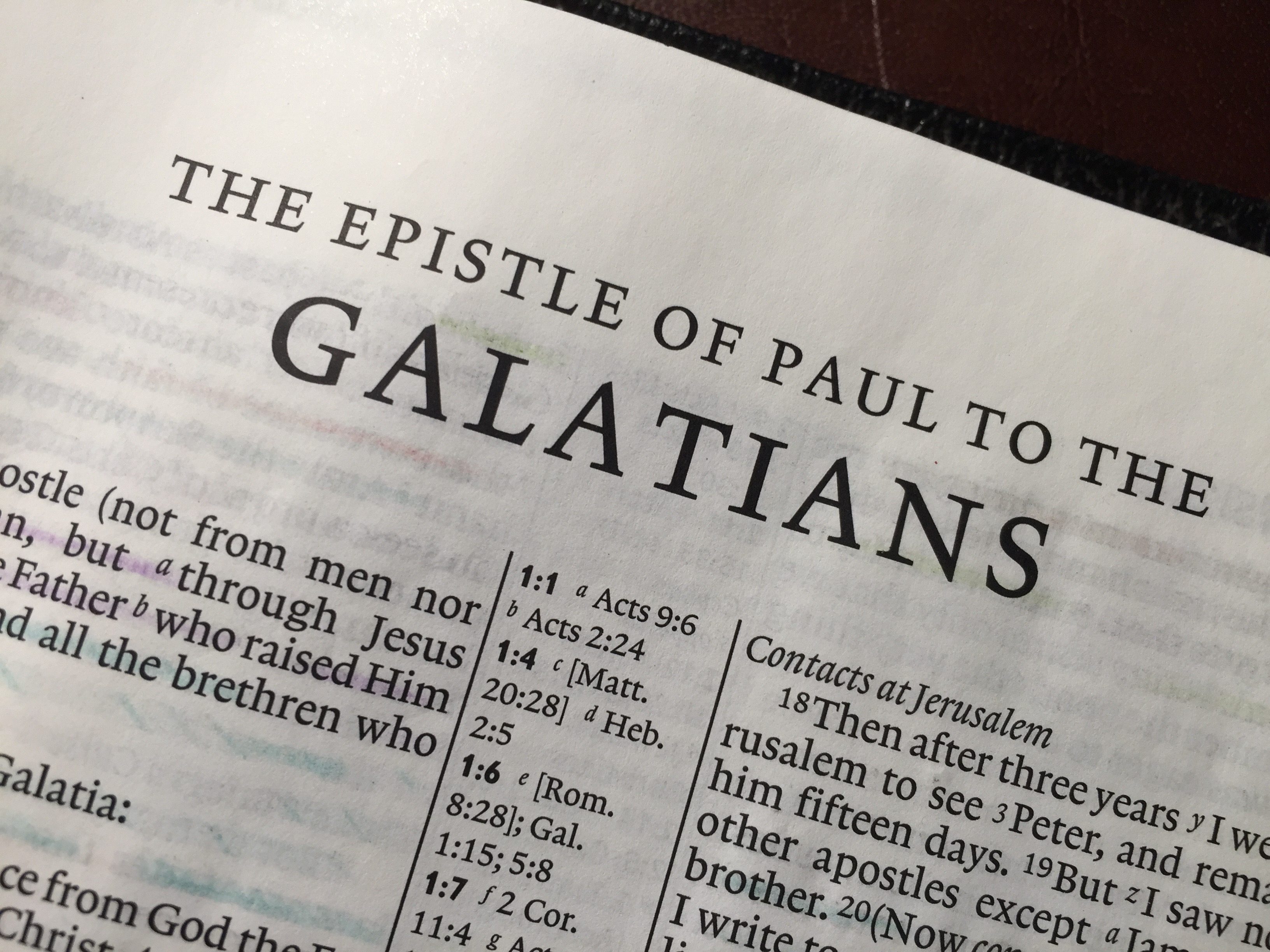Tag Archives: Law of Moses
Galatians Explained Simply from a Hebraic Perspective (Pt 2)
A Quick Overview Commentary on Galatians (explained section-by-section):
This analysis of Galatians won’t be exhaustive, detailed or comprehensive. It will be a quick overview—a skimming over the theological waves. We’ll save the details for another time.
Gal 1:6–10, Paul opens his epistle up by claiming that the Galatian believers have turned away from the basic gospel message “to another gospel” (vv. 6–7). He is so opposed to this that he places a double curse on those who are teaching this other gospel (vv. 8–9). So what is this other gospel?
Gal 1:6–7, This could be a confusing passage the way it reads in some of our Bibles until you get into the Greek. Here it is in the KJV:
I marvel that ye are so soon removed from him that called you into the grace of Christ unto another [Gr. heteros] gospel: which is not another [Gr. allos]; but there be some that trouble you, and would pervert the gospel of Christ. (KJV)
How do we make sense of what Paul is saying here? It is only understood by looking at the Greek words. The English word for another is two different words in Greek with two slightly different meanings. According to Moulton and Milligan (quoting Lightfoot in Vocabulary of the Greek NT) “the primary distinction between allos and heteros is that the Continue reading
Galatians Explained Simply from a Hebraic Perspective (Pt 1)
An Important Question
Let us first ask an important question that has far-reaching implication including whether you can trust the Bible and whether you are saved or not. In the Epistle to the Galatians, is Paul advocating the abrogation of the Torah-law as mainstream Christianity teaches?
This is the lens through which most Christians view Galatians. For example, the chapter subheadings in my NKJV Bible reveal the antitorah bias of mainstream Christianity. The heading above Galatians 2:11 reads, “No Return to the Law,” and the heading over Gal 3:10 reads, “ The Law Brings a Curse.” When Christians study their Bibles and encounter these subheadings that are written by men and not inspired by the Spirit, what are they to think? Most don’t questions the scholars who translate the Bible or the publishers sell the Bibles. Most readers will automatically thinks to themselves, “After all, these translators and publishers are Bible experts, they know more than I do, so who am I to question them?”
Interestingly, the same author of Galatians elsewhere admonishes us to, “Prove/test all things; hold fast to that which is good” (1 Thess 5:21). This is the responsibility of each saint as he studies the word of Elohim. Therefore, it behooves us to have a touch of intellectual scepticism when studying the Scriptures to insure that we’re not unwittingly putting our faith in the traditions and doctrines of men by which the word of Elohim has been made of none-effect (Mark 7:9, 13), and that we haven’t inherited lies that have been passed on down to us from our spiritual fathers (Jer 16:19). Let us instead be like the righteous Bereans who “searched the Scriptures daily to find out whether these things were so” (Acts 17:11).
Instead of looking at Galatians as a stand-alone book, let’s view it in the broader context of all the New Testament writers’ and Yeshua’s view of the Torah. After all, the Scriptures cannot contradict themselves. The Bible doesn’t lie, Elohim doesn’t change, and Yeshua declared that the Scriptures can’t be broken (or loosened, untied, dissolved, annulled, John 10:35).
In 1 Cor 11:1, Paul instructed us to imitate him as he imitated Messiah. So let’s follow Paul’s advice.
What did Yeshua teach and do vis-à-vis the Torah?
He never violated the Torah (or sinned), or else he couldn’t have been our sin-free Savior and taken upon himself the consequences or penalty of our sins, which is death.
Yeshua advocated Torah-obedience for his followers (Matt 5:17–19; John 14:15).
Paul goes on to tell us to imitate him as he imitates Yeshua. This includes obedience to the Torah.
Elsewhere, in many places, Paul advocates Torah obedience as we will see next.
How Did Paul View the Torah (“Law”)?
In answering this question, let us allow Paul to speak for himself in order to establish his predisposition with regard to the Torah-law. Was he a proponent or opponent of it? Several Scriptural quotations from his own pen should suffice in answering this question:
Wherefore the law [Torah] is holy, and the commandment holy, and just, and good. (Rom 7:12)
For we know that the law [Torah] is spiritual: but I am carnal, sold under sin. (Rom 7:14)
For I delight in the law [Torah] of Elohim after the inward man… (Rom 7:22)
What shall we say then? Shall we continue in sin [i.e., violation of the laws/Torah of YHVH, see 1 John 3:4], that grace may abound? Elohim forbid. How shall we, that are dead to sin, live any longer therein? (Rom 6:1–2)
Do we then make void the law through faith? Elohim forbid: yea, we establish the law. (Rom 3:31, Romans was written in about A.D. 56)
But we know that the law [Torah] is good, if a man use it lawfully…(1 Tim 1:8, First Timothy was written just before Paul’s martyrdom in about A.D. 66)
But if, while we seek to be justified by Messiah, we ourselves also are found sinners [i.e., violators of the law/Torah], is therefore Messiah the minister of sin [lawlessness/Torahlessness]? Elohim forbid. (Gal 2:17, Galatians was written between A.D. 55 to 56)
Toward the end of Paul’s life and ministry when, according to many Christian theologians, Paul was supposed to have already liberated the first-century believers from the “shackles and bondage” of the Torah-law, yet in the Book of Acts we read the following:
And when they heard it, they glorified YHVH, and said unto him, Thou seest, brother, how many thousands of Jews there are which believe [in Yeshua the Messiah]; and they are all zealous of the law [Torah]: And they are informed of thee, that thou teachest all the Jews which are among the Gentiles to forsake Moses, saying that they ought not to circumcise their children, neither to walk after the customs. What is it therefore? The multitude must needs come together: for they will hear that thou art come. Do therefore this that we say to thee: We have four men which have a vow on them; them take, and purify thyself with them, and be at charges with them, that they may shave their heads: and all may know that those things, whereof they were informed concerning thee, are nothing; but that thou thyself also walkest orderly, and keepest the law [Torah]. (Acts 20:20–24, written in about A.D. 58 to 60)
While he answered for himself, neither against the law [Torah] of the Jews, neither against the temple, nor yet against Caesar, have I offended any thing at all. (Acts 25: 8; Paul made this statement in a court of law about A.D. 62.)
And it came to pass, that after three days Paul called the chief of the Jews together: and when they were come together, he said unto them, Men and brethren, though I have committed nothing against the people, or customs of our fathers, [i.e., the Torah] yet was I delivered prisoner from Jerusalem into the hands of the Romans. (Acts 28:17, written about A.D. 63)
Viewing Galatians Through a Different Lens
In view of the fact that Paul instructed us to imitate him as imitated Yeshua, who was Torah observant, and in light of the fact in numerous places in Paul’s own writings and in the Book of Acts we see that Paul was Torah observant to the end of his life, what conclusion can we come to in light of these facts? Either the Bible is consistent, and the Torah is for all people for all time, or Paul was an inconsistent liar in telling us, on the one hand, to follow the Torah, and on the other hand, telling us not to obey it. Which is it? If Paul is inconsistent, then the truth of the Bible is inconsistent, the Scripture is broken, Yeshua is a liar and the Bible is a lie. Which one is it?
There is another answer to this dilemma. Perhaps the mainstream church has misinterpreted Paul in the Book of Galatians and has come to a skewed view in believing that Paul abrogates the Torah in Galatians. We take the position of the inerrancy of Scripture, that it can’t be broken, that Elohim and Yeshua don’t lie, and that Paul wasn’t a duplicitous schizophrenic. Instead of viewing Galatians as an antitorah tirade courtesy of Paul, maybe there is something else going on here that needs to be discovered—the real message of Galatians that in no way contradicts the rest of the Bible.
Stay tuned. There is more to follow on this subject…
Man is the liar, NOT Elohim!
Numbers 23:19, El is not a man that he should lie. Read the rest of this verse, which speaks about the immutable character of Elohim. (Also see Mal 3:6; Heb 13:8.)
From the beginning in the Garden of Eden (thanks to the lies of Satan the serpent, see Gen 3:1–4), man has been under the spiritual delusion that Elohim changes his word, laws or commandments and that he doesn’t really mean what he says. That is to say, when YHVH gives a command, later on he may change his mind and his commands are no longer applicable to subsequent generations or people-groups.
Down through the ages, church leaders have bought in to this lie of the enemy with regard to validity of the Torah as pertaining to the life of the redeemed believer. But by saying that the Torah is “done away with,” “has been nailed to the cross” “has been fulfilled in Jesus” meaning “he did it for us so that we don’t have to do it,” isn’t this really calling Elohim a liar?
Now consider the numerous places throughout the Bible, the Word of Elohim, where the Torah is revealed as YHVH’s unalterable standard of righteousness for all time and for all people everywhere. (In this regard, read the following scriptures: Ps 119:44, 142, 144, 160, 172; Matt 4:4; 5:18–19; Rom 3:31; 7:12.)
Who is really the liar? Man or Elohim?
New Video: What Is the Higher and the Highest Torah?
What Is the Ultimate Goal of the Torah?
The Higher Torah and the Highest Torah Explained
The Torah is NOT the ultimate goal! The Torah, as wonderful as it is, points us to something even even better and higher!
What are the weightier matters of the Torah? Perfect obedience to the Torah is not the ultimate goal of the saint. The Torah is merely a vehicle to lead us to something. What is that? What is the greater Torah, the higher and the highest Torah? What really matters to YHVH when all is said and done???? The Gospel of Matthew (Matt 23:23) records that Yeshua rebuked the religious leaders of his day for their not following the higher Torah.
Woe unto you, scribes and Pharisees, hypocrites! for ye pay tithe of mint and anise and cumin, and have omitted the weightier matters of the Torah, judgment, mercy, and faith: these ought ye to have done, and not to leave the other undone.
What did he really mean by “the weightier matters of the Torah”?
The Deeper Meaning of the Word “Torah”
Almost every place where you see the word “law” in the Old Testament (or Tanakh), it is the Hebrew word “Torah.” This word is used 219 times in the Tanakh, and in almost every case it is translated in the KJV and in most other English Bibles as “the law.” Is this all this word means? Is “law” even its main definition according to the Hebrew?
Let’s begin to answer this question by asking another one. When you think of the term “the laws” what comes into our mind: good thoughts or bad thoughts? Do you think Continue reading
Did the Torah “enter” at Mount Sinai?
Romans 5:20, The law [Torah] entered. The Scriptures reveal that the Torah pre-existed Moses and Mount Sinai. So what is Paul talking about in this passage when he says that “the Torah entered”? Obviously, he is referring to the Torah in its legally codified form as given to the nation of Israel at Mount Sinai. For the nation of Israel to function in a righteous, orderly and cohesive manner, it needed the Torah in written form (in a legal format), so that the leaders of Israel could refer to it even as lawyers and judges refer to a nation’s written legal code when practicing law or making legal judgments.
The offence might abound. Of course, with the Torah written down in black and white, so to speak, and with an established and recorded legal code in place to which legal judges could refer and to which all of Israel’s citizens were held accountable, the knowledge and awareness of what constituted sin (remember, Scripture defines sin as “the violation of the Torah” in 1 John 3:4) would increase. The result was that all became painfully aware of what human actions constituted sin, and that man would have a harder time getting away with sins now that Torah was the legal code of the land with fines and penalties for its violation, and a judicial system in place to enforce the Torah.
Sin abounded…grace did much more abound. As the sinner became painfully more aware of his sin or his violation of the Torah, he also became more aware of YHVH’s mercy and grace toward the sinner—when the sinner would repent and fulfill the requirements necessary to receive atonement for his sins.





